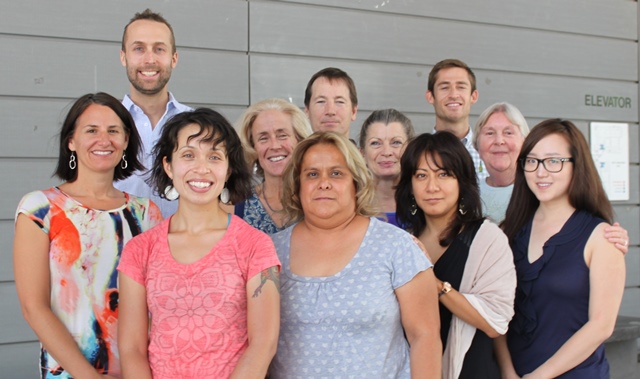CDC Awards $4 Million to Arizona Prevention Research Center
The award will fund public health prevention research at the University of Arizona Mel and Enid Zuckerman College of Public Health with a focus on reducing health disparities among Latinos living in Southern Arizona.

Researchers and staff of the Arizona Prevention Research Center at the University of Arizona Mel and Enid Zuckerman College of Public Health.
The federal Centers for Disease Control (CDC) awarded $4 million to the Arizona Prevention Research Center (AzPRC) at the University of Arizona Mel and Enid Zuckerman College of Public Health to study how people and their communities can avoid or counter the risks for chronic illnesses. The funds will support the development and evaluation of practical public health prevention interventions in Arizona, with particular focus on Latinos living in border communities.
In May, the CDC awarded $19.5 million to its network of 26 Prevention Research Centers (PRC) which are housed within academic institutions. The AzPRC is one of only two centers funded in the southwestern United States. Each PRC conducts prevention research and translates the results into public health policies and practices that drive major sustainable community changes that can prevent and control chronic diseases and improve overall health.
Over the next five years, researchers at the AzPRC will partner with El Rio, Mariposa and Sunset Community Health Centers and health departments in Pima and Yuma counties to improve the prevention of chronic diseases such as diabetes and heart disease while promoting mental well-being through innovative community-based interventions. In addition, the center will partner closely with the Arizona Department of Health Services to disseminate and evaluate effective policy, environmental and systems change strategies designed to prevent chronic disease.
“Preventing chronic disease is critical to improving our nation’s well-being and avoiding excessive health care costs,” said Wayne Giles, MD, MS, director of CDC’s Division of Population Health. “Our investment in the prevention research centers moves us closer to ensuring all Americans share the richness of good health.”
For the past 15 years, the AzPRC has worked closely with health departments, community health centers and public health agencies to develop and test health promotion programs designed to help people avoid or counter the risks for chronic illnesses.
“This is an outstanding opportunity to affect change in our most disadvantaged neighborhoods,” said Scott Carvajal, PhD, MPH, director of the AzPRC. “We will be tackling ways to improve diet and fitness along with promoting mental well-being in the community with programs in their neighborhoods. Further, our collaborations with the community health center partners will result in an efficient and effective program for health promotion that could be a model for communities across the United States.”
Central to AzPRC efforts has been developing and testing interventions that rely upon community health workers (CHWs), who provide education and support for healthy lifestyles and environments.
“Community health workers will play a pivotal role in providing a continuum of care that extends from the doctor’s office into the home and the community,” said Maia Ingram, MPH, deputy director of the AzPRC.
In previous research projects, the AzPRC trained community health workers in Yuma and Santa Cruz counties to create environments that encourage healthy behaviors. CHWs at Campesinos Sin Fronteras (Farmworkers Without Borders) worked with youth who convinced the Somerton City Council, located near Yuma in southwestern Arizona, to create a smoke free park. CHWs at the Mariposa Community Health Center worked with community members in Nogales, Ariz. to address public transportation needs.
Among the additional members of the research team from the UA College of Public Health are Jill de Zapien, associate dean for community programs; Kerstin M. Reinschmidt, PhD, MPH, assistant professor of health promotion sciences, who will co-direct the research component of the center; and researchers from the UA College of Science and UA College of Pharmacy.
For more information about the AzPRC, visit its website at azprc.arizona.edu.

